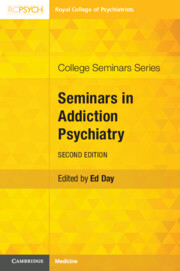Book contents
- Seminars in Addiction Psychiatry
- College Seminars Series
- Seminars in Addiction Psychiatry
- Copyright page
- Contents
- Contributors
- Preface
- Chapter 1 Historical and Conceptual Approaches to Addiction
- Chapter 2 Illicit Drug Use: Epidemiology, Aetiology and Prevention
- Chapter 3 Illicit Drug Use: Clinical Features and Treatment
- Chapter 4 Addiction to Prescription Medication: Benzodiazepines, Z-Drugs and Gabapentinoids
- Chapter 5 Alcohol Use Disorders: Epidemiology and Prevention
- Chapter 6 Alcohol Use Disorders: Aetiology and Pathophysiology
- Chapter 7 Alcohol Use Disorders: Clinical Features and Treatment
- Chapter 8 Psychological Approaches to Addiction
- Chapter 9 Comorbid Substance Use and Mental Illness
- Chapter 10 Medical Aspects of Drug and Alcohol Use
- Chapter 11 Organising Treatment Services for Drug and Alcohol Misusers
- Chapter 12 Tobacco Use Disorders
- Chapter 13 Novel Psychoactive Substances and Club Drugs
- Chapter 14 Addiction Problems in a Family and Social Context
- Chapter 15 Addiction Recovery Mutual-Aid Organisations
- Index
- References
Chapter 15 - Addiction Recovery Mutual-Aid Organisations
Published online by Cambridge University Press: 02 November 2021
- Seminars in Addiction Psychiatry
- College Seminars Series
- Seminars in Addiction Psychiatry
- Copyright page
- Contents
- Contributors
- Preface
- Chapter 1 Historical and Conceptual Approaches to Addiction
- Chapter 2 Illicit Drug Use: Epidemiology, Aetiology and Prevention
- Chapter 3 Illicit Drug Use: Clinical Features and Treatment
- Chapter 4 Addiction to Prescription Medication: Benzodiazepines, Z-Drugs and Gabapentinoids
- Chapter 5 Alcohol Use Disorders: Epidemiology and Prevention
- Chapter 6 Alcohol Use Disorders: Aetiology and Pathophysiology
- Chapter 7 Alcohol Use Disorders: Clinical Features and Treatment
- Chapter 8 Psychological Approaches to Addiction
- Chapter 9 Comorbid Substance Use and Mental Illness
- Chapter 10 Medical Aspects of Drug and Alcohol Use
- Chapter 11 Organising Treatment Services for Drug and Alcohol Misusers
- Chapter 12 Tobacco Use Disorders
- Chapter 13 Novel Psychoactive Substances and Club Drugs
- Chapter 14 Addiction Problems in a Family and Social Context
- Chapter 15 Addiction Recovery Mutual-Aid Organisations
- Index
- References
Summary
The complexity of addiction has led to the emergence of free community-based peer-led resources for their management, which have grown substantially in many countries to help initiate and sustain recovery-related changes. This chapter highlights the similarities and differences between these mutual help organisations (MHOs; also referred to as mutual-aid or self-help groups), such as Alcoholics Anonymous (AA), Narcotics Anonymous and other 12-step-based entities, as well as newer entities, such as SMART Recovery, LifeRing, Women for Sobriety and Celebrate Recovery. The chapter begins by outlining the different major MHOs and reviewing the scientific research conducted on them pertaining to recovery benefits; the mechanisms of behaviour change through which they are purported, and have been shown, to convey benefits; and the potential for healthcare cost reductions and cost effectiveness. In the final section commonalities among these ostensibly different MHOs are described and future directions are discussed.
Keywords
- Type
- Chapter
- Information
- Seminars in Addiction Psychiatry , pp. 266 - 279Publisher: Cambridge University PressPrint publication year: 2021

